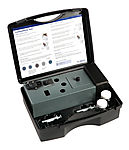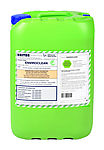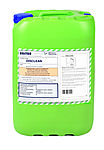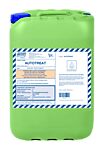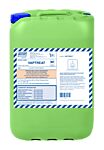


Last updated: 02/11/2023 02:01:17
FUEL POWER CONDITIONER 25 LTR
Product Code
- Product group:
- 650
- Product number:
- 778785
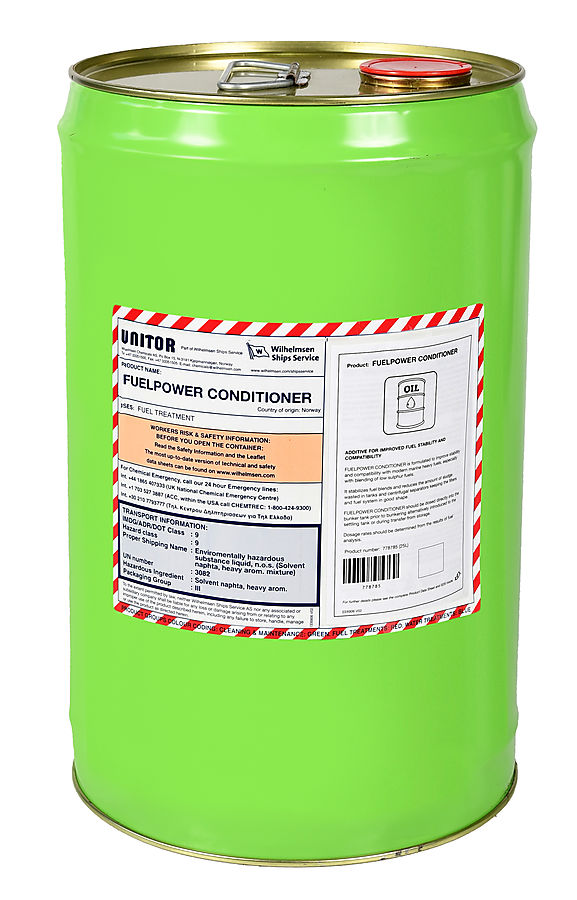
Unitor™ FuelPower™ Conditioner is the market leading solution for asphaltenic sludge control as well as keeping fuel tanks clean. The product works with HSFO and the new VLSFO introduced through IMO 2020. Sedimentation of residual fuels is a common problem and can be reduced with Unitor™ FuelPower™ Conditioner.

Product information
This product supersedes product no: 766154
Fuel stability and compatibility is an increasing problem with modern marine heavy fuels, especially with blending of low sulfur fuels.
The solution for handling these unstable and incompatible fuels is Unitor™ FuelPower™ Conditioner, it stabilizes and stops sludge formation in fuel tanks.
Unitor™ FuelPower™ Conditioner also improves separation reducing the amount of sludge wasted keeping the fuel homogeneous through the whole fuel system delivering a stable fuel ready for combustion.
Features
- Stabilizes fuel blends, reducing compatibility problems
- Disperses and prevents sludge formation
- Reduces the amount of sludge wasted in the centrifugal separator
Benefits
- The conditioning properties of Unitor™ FuelPower™ Conditioner ensures your fuel is stable and that a minimum of sludge is wasted in tanks and centrifugal separators
- With purifier working efficiently, filters clean and fuel system in good shape you can focus on the important things
Specification
General
| Invent Hazard Material (IMO/EU) classification | C-6 |
|---|
Physical properties
| Appearance | Clear, light brown |
|---|---|
| Density [kg/dm3] | 0,84 |
| Flash Point [°C] | >61 |
| Form | Liquid |
Technical data
| Not Compatible | May swell rubber and synthetic rubber |
|---|
Safety Data Sheet (SDS)
Documents
Directions for use
**Dosage and Control**
Ideally, FuelPower Conditioner should be dosed directly into the bunker tank prior to bunkering. However, it can be introduced to the settling tank or during transfer from storage. Dosage rates are best determined from the results of fuel analysis, i.e. sediment content or compatibility test which is easily performed on board using the Compatibility Test Kit.
ASTM SPOT |
1 |
2 |
3 |
4 |
5 |
|---|---|---|---|---|---|
| DOSE RATE | **1:25 000 | 1:15 000 | 1:10000 | 1:5000 | 1:2500 |
TSP level |
Dosage (ppm) |
Comment |
|---|---|---|
| 0,01–0,03 | 1:25 000 (40 ppm) | Due to the indication of poor reserve stability of some VLSFO, we advise a low protective dosage. |
| 0,03–0,06 | 1:20 000 (50 ppm) | When the TSP increases the reserve stability of the fuel will also be poorer, so we advise a low protective dosage. |
| 0,06–0,1 | 1:15 000 (67 ppm) | Once the TSP approaches the max specification sludging will most likely occur. Reserve Stability will also be poor, so a higher dosage is recommended. |
| 0,1–0,2 | 1:10 000 (100 ppm) | With a TSP out of specification it is important to have a good impact on the sludging with a higher dosage. |
| 0,2–0,5 | 1:5 000 (200 ppm) | A far-off spec TSP fuel is never a good idea to use but when it occurs it is important to be able to reduce sludging and operational impact as much as possible. |
| 0,5+ | 1:1 000 (1000 ppm) | We would not recommend using any of these fuels but if there is no choice a high dosage needs to be used to have a chance to reduce the sludging from these fuels |
* Avoid using this fuel if possible.
** Fully compatible blends, with a sediment percentage of less than 0.05, should not require treatment for incompatibility. Marginal number 1 spots may cause sludging if the fuel is not handled carefully, so some treatment may be necessary, especially if other problems such as water content or corrosion are apparent.
If test results are not available, an initial dose of 1:15 000 is recommended, and adjustments made as necessary.
The average dosage for FuelPower Conditioner is 1:15 000 or 67 ppm. When starting a dosage into a fuel tank it is advisable to use a staged dosage to avoid high amounts of sludge from the fuel into purifiers and filters. This is especially important if the fuel tank has not been cleaned for an extended period of time. With a stage dosing smaller amounts of sludge will be picked up and over a longer period of time.
DOSING |
DOSAGE LEVEL |
COMMENT |
|---|---|---|
1st Time |
1:25 000 |
Initial dosage not to upset the tank |
2nd Time |
1:20 000 |
Second and third dosages can be done a bit higher as most of the easily available sludge will be gone |
3rd time and forward |
1:15 000 |
From the 3rd dosage and forward the recommended dosage of 1:15 000 can be used |
